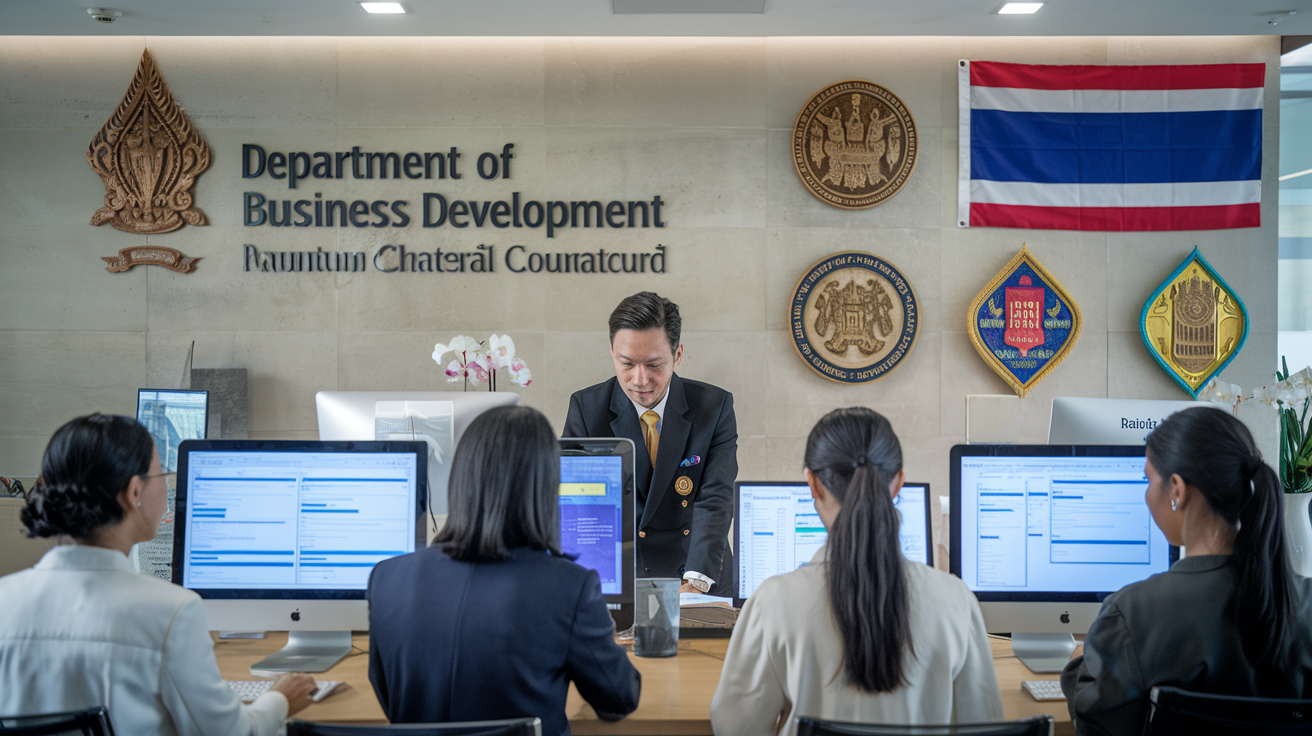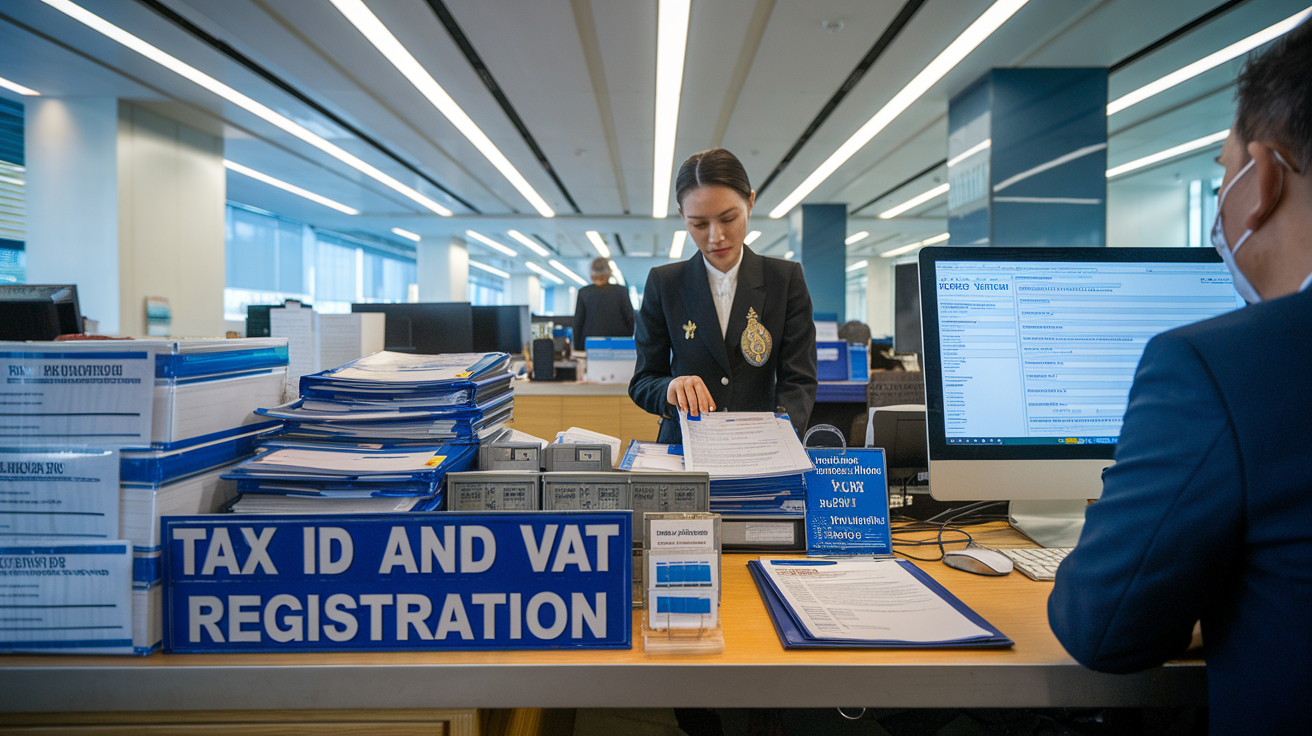Are you ready to turn your entrepreneurial dream into reality in the Land of Smiles? 🇹🇭✨ Registering a business in Thailand might seem like a daunting task, but with the right guidance, it can be a smooth and rewarding journey. Whether you’re a seasoned investor or a first-time entrepreneur, understanding the intricacies of Thai business registration is crucial for your success.
Navigating the maze of paperwork, government offices, and legal requirements can be overwhelming. From choosing the right business structure to securing necessary licenses, each step presents its own challenges. But fear not! We’ve got you covered with our comprehensive, step-by-step guide that will walk you through the entire process of registering your business in Thailand.
In this blog post, we’ll demystify the registration process, breaking it down into manageable steps. We’ll explore everything from understanding different business structures to opening your corporate bank account. So, let’s dive in and embark on your Thai business adventure! 🚀💼
Understanding Business Structures in Thailand

A. Limited Company
A Limited Company is the most common business structure for foreign investors in Thailand. It offers several advantages:
- Limited liability for shareholders
- Separate legal entity from its owners
- Ability to own property and enter into contracts
Key features of a Thai Limited Company:
| Feature | Description |
|---|---|
| Minimum shareholders | 3 |
| Foreign ownership | Up to 100% possible with restrictions |
| Minimum registered capital | 2 million THB for foreign majority |
| Board of Directors | At least 1 director required |
B. Partnership
There are three types of partnerships in Thailand:
- Unregistered Ordinary Partnership
- Registered Ordinary Partnership
- Limited Partnership
Each type has different liability and tax implications:
| Partnership Type | Liability | Tax Treatment |
|---|---|---|
| Unregistered Ordinary | Unlimited | Personal income tax |
| Registered Ordinary | Unlimited | Corporate income tax |
| Limited | Limited for some partners | Corporate income tax |
C. Sole Proprietorship
A Sole Proprietorship is the simplest business structure, suitable for small, local businesses. Key points:
- Owner has full control and profits
- Unlimited personal liability
- Limited to Thai nationals only
- Subject to personal income tax
D. Branch Office
Foreign companies can establish a Branch Office in Thailand, which:
- Is not a separate legal entity
- Conducts business on behalf of the parent company
- Requires at least one Branch Manager
- Is subject to corporate income tax on Thailand-sourced income
Now that we’ve covered the main business structures in Thailand, let’s move on to preparing the essential documents for registration.
Preparing Essential Documents

Business Registration Forms
To start the registration process, you’ll need to obtain and complete several essential forms. These include:
- Form Bor Mor Jor 001: Application for company registration
- Form Bor Mor Jor 002: List of shareholders
- Form Sor Bor Chor 3: Company name reservation
Ensure all forms are filled out accurately and legibly to avoid delays in processing.
Shareholders’ Information
Gathering comprehensive details about your company’s shareholders is crucial. This information typically includes:
| Information Required | Description |
|---|---|
| Full Name | As it appears on official documents |
| Nationality | Country of citizenship |
| Address | Current residential address |
| Shareholding Percentage | Amount of shares owned |
| Signature | For official documentation |
Company Name Reservation
Before proceeding with registration, you must reserve your company name. This involves:
- Checking name availability
- Submitting the name reservation form
- Waiting for approval (usually 3-5 business days)
Articles of Association
The Articles of Association outline the company’s internal rules and regulations. Key components include:
- Management structure
- Shareholder rights and responsibilities
- Voting procedures
- Dividend distribution policies
Memorandum of Association
This document defines the company’s relationship with external stakeholders. It typically contains:
- Company name
- Registered office address
- Business objectives
- Details of share capital
- Names of initial shareholders
With these documents prepared, you’ll be well-positioned to move forward with the registration process. The next step involves submitting these documents to the Department of Business Development.
Securing Your Business Name

A. Name Availability Check
Before finalizing your business name, it’s crucial to ensure its availability. The Department of Business Development (DBD) provides an online database where you can search for existing company names. This step helps avoid potential conflicts and trademark issues.
Steps for checking name availability:
- Visit the DBD website
- Navigate to the name search tool
- Enter your proposed business name
- Review the results for any matches or similarities
B. Name Reservation Process
Once you’ve confirmed your desired name is available, you can proceed with the reservation process. This step secures your chosen name for a limited time, giving you the opportunity to complete the registration process.
| Reservation Detail | Information |
|---|---|
| Validity Period | 30 days |
| Extension | Possible for additional 30 days |
| Cost | 20 Baht per name |
| Method | Online or in-person at DBD office |
C. Naming Restrictions
When selecting a business name in Thailand, be aware of certain restrictions to ensure compliance with local regulations:
- Must not be identical or confusingly similar to existing registered names
- Cannot include words implying connection with the royal family or government agencies
- Must not be offensive or contrary to public order or good morals
- Should not mislead about the nature of the business
- Must include “Company Limited” in Thai (“บริษัท จำกัด”) or English at the end
Now that you’ve secured your business name, the next step involves registering with the Department of Business Development to officially establish your company.
Registering with the Department of Business Development

Online Registration Option
For entrepreneurs looking to streamline the registration process, the Department of Business Development (DBD) offers a convenient online registration option. This digital route allows you to submit your application and documents from the comfort of your office or home, saving time and reducing paperwork.
To utilize the online registration system:
- Visit the official DBD website
- Create an account and log in
- Fill out the required forms electronically
- Upload scanned copies of necessary documents
- Pay registration fees online
- Submit your application
| Advantages | Disadvantages |
|---|---|
| Time-saving | Requires reliable internet connection |
| 24/7 accessibility | May face technical issues |
| Reduced paperwork | Less personal assistance |
| Faster processing | Limited to certain business types |
In-Person Registration Process
For those who prefer a more traditional approach or need personalized assistance, the in-person registration process remains a viable option. This method involves visiting the DBD office and submitting your application and documents in person.
Steps for in-person registration:
- Gather all required documents
- Visit your local DBD office
- Submit your application and documents to the officer
- Pay registration fees at the counter
- Receive a receipt and estimated processing time
Required Fees and Timeframes
The registration fees and processing times can vary depending on the type of business and the chosen registration method. Generally, online registration tends to be faster and may offer slightly reduced fees.
| Registration Type | Fees (THB) | Processing Time |
|---|---|---|
| Online | 5,000 – 25,000 | 1-3 business days |
| In-Person | 5,500 – 28,000 | 3-5 business days |
It’s important to note that these fees and timeframes are subject to change. Always check the latest information on the DBB website or consult with a local business registration expert for the most up-to-date details.
With your registration complete, the next crucial step is obtaining your Tax ID and VAT registration to ensure compliance with Thai tax regulations.
Obtaining Tax ID and VAT Registration

A. Tax Identification Number (TIN)
Obtaining a Tax Identification Number (TIN) is a crucial step in registering your business in Thailand. The TIN is a unique 13-digit number issued by the Revenue Department, essential for tax filing and other official transactions.
To obtain a TIN:
- Visit the local Revenue Department office
- Submit the required documents
- Complete the application form
- Receive your TIN (usually issued on the same day)
B. Value Added Tax (VAT) Registration
VAT registration is mandatory for businesses with annual turnover exceeding 1.8 million baht. Even if your turnover is below this threshold, voluntary registration can be beneficial.
| VAT Registration Type | Annual Turnover | Benefits |
|---|---|---|
| Mandatory | > 1.8 million baht | Legal compliance |
| Voluntary | < 1.8 million baht | Input tax credits, credibility |
C. Timeline and Requirements
The process of obtaining a TIN and VAT registration typically takes 1-2 business days. Here’s a breakdown of the timeline and requirements:
-
TIN Application:
- Same-day issuance
- Required documents: Company registration, director’s ID
-
VAT Registration:
- 1-2 business days
- Additional requirements: Business plan, office lease agreement
Remember to apply for these registrations within 60 days of starting your business operations or reaching the VAT threshold. Timely registration ensures compliance with Thai tax regulations and avoids potential penalties.
Registering for Social Security

Employer Registration
Registering for social security is a crucial step for businesses in Thailand. As an employer, you must register with the Social Security Office (SSO) within 30 days of hiring your first employee. Here’s a quick guide to the process:
-
Gather required documents:
- Company registration certificate
- VAT registration (if applicable)
- List of employees
- Company director’s ID
-
Submit the application:
- Visit your local SSO branch
- Fill out Form SSO 1-01
- Provide all necessary documents
Once registered, you’ll receive an employer account number, which you’ll use for future SSO transactions.
Employee Registration Process
After registering as an employer, you must register your employees within 30 days of their start date. The process involves:
- Completing Form SSO 1-03 for each employee
- Submitting copies of employees’ ID cards or passports
- Providing employment contracts or work permits for foreign workers
| Thai Employees | Foreign Employees |
|---|---|
| ID card copy | Passport copy |
| – | Work permit copy |
Contribution Rates and Benefits
Social security contributions in Thailand are shared between employers and employees. The current rates are:
- Employer: 5% of employee’s salary (capped at 750 baht per month)
- Employee: 5% of their salary (capped at 750 baht per month)
These contributions provide various benefits to employees, including:
- Medical care
- Disability compensation
- Child allowance
- Unemployment benefits
- Old-age pension
Now that we’ve covered social security registration, let’s move on to acquiring the necessary licenses and permits for your business in Thailand.
Acquiring Necessary Licenses and Permits

Foreign Business License
For foreign-owned businesses in Thailand, obtaining a Foreign Business License (FBL) is often crucial. The FBL allows non-Thai companies to operate in sectors typically restricted to Thai nationals. Here’s a breakdown of the process:
-
Determine if you need an FBL:
- Check if your business activity is restricted
- Verify your company’s foreign ownership percentage
-
Prepare required documents:
- Application form
- Company registration
- Business plan
- Financial statements
-
Submit application to the Ministry of Commerce
-
Await approval (typically 60-90 days)
Specific Industry Permits
Depending on your business type, you may need additional permits. Here’s a table of common industries and their required permits:
| Industry | Required Permit | Issuing Authority |
|---|---|---|
| Food & Beverage | Food Production License | FDA Thailand |
| Tourism | Tourism Business License | Ministry of Tourism |
| Education | Educational Institution License | Ministry of Education |
| Construction | Construction Permit | Local Municipality |
Work Permit for Foreign Nationals
Foreign employees, including business owners, must obtain a work permit. Steps include:
- Secure a Non-Immigrant B Visa
- Prepare necessary documents:
- Passport copies
- Educational certificates
- Employment contract
- Company documents
- Submit application to the Ministry of Labor
- Collect work permit upon approval
Now that you understand the necessary licenses and permits, let’s explore the final step in establishing your business presence in Thailand: opening a corporate bank account.
Opening a Corporate Bank Account

A. Required Documents
To open a corporate bank account in Thailand, you’ll need to prepare several essential documents:
- Company Registration Certificate
- Memorandum of Association
- Articles of Association
- List of shareholders
- Board of Directors resolution authorizing account opening
- Passport copies of all directors and authorized signatories
- Tax ID certificate
- Company seal (if applicable)
It’s crucial to have these documents properly prepared and certified to streamline the account opening process.
B. Bank Selection Tips
When choosing a bank for your corporate account in Thailand, consider the following factors:
- International presence
- Online banking capabilities
- Transaction fees
- Branch network
- Customer service quality
| Bank | International Presence | Online Banking | Transaction Fees |
|---|---|---|---|
| Bangkok Bank | Extensive | Advanced | Competitive |
| Kasikorn Bank | Moderate | User-friendly | Average |
| Siam Commercial Bank | Limited | Good | Low |
C. Account Types and Benefits
Thai banks offer various corporate account types, each with unique benefits:
-
Current Account:
- Ideal for daily transactions
- Comes with checkbook facility
-
Savings Account:
- Earns interest on deposits
- Suitable for maintaining reserve funds
-
Fixed Deposit Account:
- Higher interest rates
- Good for long-term savings
-
Foreign Currency Account:
- Helps manage international transactions
- Reduces currency conversion costs
Choose the account type that best aligns with your business needs and financial goals. Many banks offer package deals combining multiple account types with additional benefits such as preferential exchange rates or fee waivers.

Navigating the process of registering a business in Thailand may seem daunting at first, but with the right knowledge and preparation, it can be a smooth journey. From choosing the appropriate business structure to securing necessary licenses, each step plays a crucial role in establishing your company on solid legal ground. Remember to carefully prepare all required documents, secure your business name, and complete registrations with relevant government bodies.
As you embark on your entrepreneurial journey in Thailand, consider seeking professional assistance to ensure compliance with local regulations. By following this step-by-step guide and staying informed about any changes in Thai business laws, you’ll be well-equipped to launch and grow your business in this vibrant Southeast Asian economy. With dedication and attention to detail, your new venture in Thailand can thrive and contribute to the country’s dynamic business landscape.

